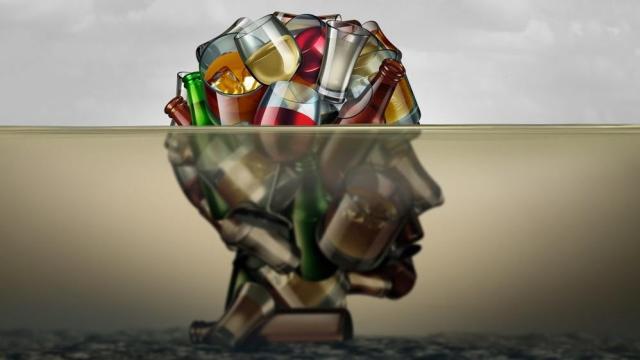Alcohol addiction could become a thing of the past with a new gene therapy that appears to significantly reduce alcohol cravings in monkeys, according to a new study published this week in the journal Nature Medicine. The gene therapy was tested on macaque monkeys over 12 months, revealing promising results.
In many cases, people with an alcohol disorder relapse after they complete treatment programs, but Kathleen Grant and her team believe they may be onto a long-term fix. When individuals consume alcohol, the first few drinks raise their dopamine levels which increases their happiness but need to continue drinking to maintain the euphoric feeling. Now, Grant and her team are focusing on gene therapy in monkeys to determine if it can decrease their chronic alcohol abuse.
“We know that we can get people with alcohol use disorder to stop drinking for short periods of time,” Grant, who is a neuroscientist at Oregon Health & Science University told Wired. “But the desire to drink again often supersedes taking their medications.”
At the beginning of the study, the monkeys were gradually given alcohol until an addiction was established. Then, they began self-regulating their own intake at an amount equating to roughly nine drinks per day for a human. The researchers separated the macaques into a control group and a separate group that received the gene therapy.
According to the study, the monkeys’ daily alcohol consumption increased over the first six months before an eight-week abstinence period was initiated. The gene therapy was applied by inserting two small holes in the macaques’ skulls, and researchers injected a gene that makes the glial-derived neurotrophic factor, or GDNF protein, which stimulates the amount of dopamine produced. Then the monkeys were given the option to drink water or alcohol for four weeks.
What researchers found astounded them. Just one round of gene therapy resulted in the test group reducing their drinking by 50% compared to the control group which didn’t receive therapy. Subsequent test periods used a four-week window of drinking and a four-week window of abstinence. With each round of therapy, researchers found the test group voluntarily consumed less alcohol after the abstinence period, and by the end of the 12-month study, that amount dropped by more than 90%.
“These findings support the idea that normalizing dopamine, or perhaps just boosting the levels of beneficial growth factors like GDNF, could be a useful strategy for reducing the drive to drink alcohol,” Donita Robinson, a professor of psychiatry and researcher at the University of North Carolina Bowles Center for Alcohol Studies, who wasn’t involved with the experiment, told Wired.
However, researchers also found that the therapy could also influence other behaviours such as weight loss and water intake. The macaques in the test group drank less water compared to the control group and lost about 18% of their body weight, although the study suggests this could be due to less alcohol consumption. Additional research is needed to look into changes in the macaques’ mindset, mood, and activity levels, Robinson told Wired.
The GDNF gene therapy is currently used to treat Parkinson’s disease but could now be a major breakthrough in substantially reducing alcohol use disorder. “Drinking went down to almost zero,” Grant told OHSU News. “For months on end, these animals would choose to drink water and just avoid drinking alcohol altogether. They decreased their drinking to the point that it was so low we didn’t record a blood-alcohol level.”
Grant and her team said in the study that the resounding efficacy of GDNF gene therapy is promising for those who struggle with alcohol use disorder, and believe it could be effective in treating other substance abuse disorders. However, the therapy treatment would not be widely accessible and with other options on the market, it should be used as a last resort form of treatment.
“It would be most appropriate for people who have already shown that all our normal therapeutic approaches do not work for them,” Grant told OHSU. She added, “They are likely to create severe harm or kill themselves or others due to their drinking.”
According to the National Institute on Alcohol Abuse and Alcoholism, alcohol-related deaths present a significant problem globally, with an estimated 140,000 associated deaths annually.
